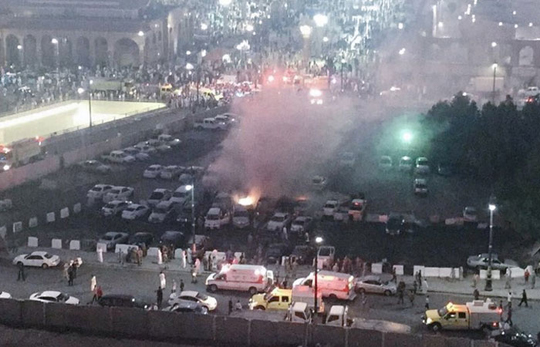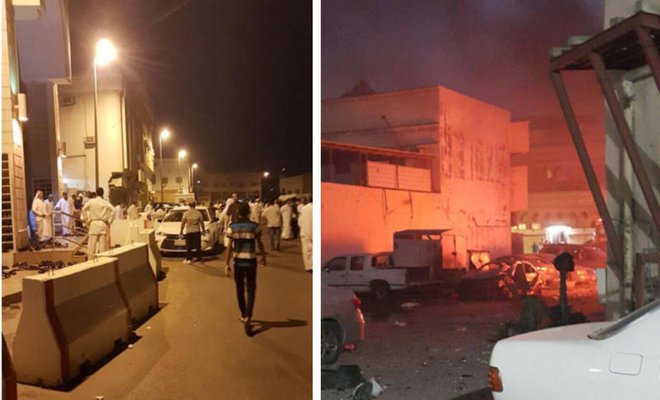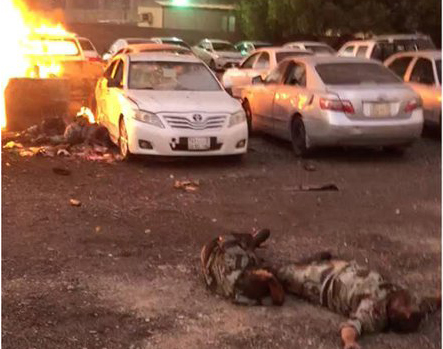Riyadh, Jul 4: Three suicide bombers struck in Saudi Arabia today in a rare incidence of multiple attacks in the kingdom where the anti-Islamic group called Islamic State' has previously staged deadly attacks. There were no immediate claims of responsibility.

The latest explosion occurred outside of Islam's three holiest sites, the Prophet's Mosque (Masjid an-Nabawi) in Madinah in the kingdom's west where Muhammad (pbuh) established first Islamic society after migration from Makkah.
Al-Arabiya said the Madinah incident occurred during sunset prayers after which Muslims break their fast during the holy month of Ramadan, which ends Tuesday.
Four policemen were killed and five others were injured in Madinah when a suicide bomber struck in the vicinity of a police post outside the Prophet's Mosque, according to the interior ministry.
The bombing took place in a parking lot between the city court and the mosque, visited by millions every year.
When security officials became suspicious of an individual who was heading to the Prophet's Mosque they approached him resulting in him triggering his explosive belt killing four of the officers and injuring others.
The Prophet's Mosque is particularly crowded during the Muslim holy month of Ramadan, which is supposed to be a time of charity but has seen spectacular attacks around the region.
Earlier, in Qatif, two suicide bombers blew themselves up one after the other outside the Faraj Al-Omran Mosque. No casualties were reported. A witness said a car bomb was detonated near the mosque, which was followed by a suicide attack just before 7 p.m. Police have launched an investigation into the attack.
Before that at 2:15 a.m., a suicide bomber blew himself up near the US Consulate in Jeddah. Security officers confronted him as he moved suspiciously at a parking lot of the Dr. Soliman Fakeih Hospital. Two policemen were wounded lightly in the attack.
Maj. Gen. Mansour Al-Turki, Interior Ministry spokesman, said the bomber, in his 30s, was identified as an expatriate from the Pakistan.
Photos taken from the scene showed the bomber's body dismembered by the blast.
Daesh has carried out a series of bombing and shooting attacks in Saudi Arabia since 2014 that have killed scores of people, mostly Shiites and members of the security services. In January, a suicide bomber attacked a mosque in Al-Ahsa, killing four people before worshippers disarmed and tied up an accomplice who had shot at them.
In October last year, a gunman opened fire on worshippers in Qatif, killing five people before he was shot dead by police.
Also Read: 4 cops sacrifice their lives to prevent suicide bomber from entering Prophet's mosque







Comments
Bopanna is currect ,because information he has is only from media. Media is dominated by westerns who are waging war with islam . Today's youth are dumb and def what they listen from media they believe. Only they don't believe is true message of Quran .
Bopanna ...your phrase is outdated.....
And mind you.... because of the Islamic country's Saudi;s sharia law you are highly secured in the Kingdom
probably Saudi is the only country to execute more terrorists than any other country
Nice try Ashish. Why is it that 99% of bombings are done by Muslims ? Immediately you guys say that they have nothing to do with Islam. Ye kab tak chalaoge ?
No Islam = Know Peace
Know Islam = No peace
Mr. Bopanna,
Hinduism cannot be blamed for all the acts executed by hindutva activits(Self claimed). Similarly, Islam cannot be blamed for bunch of few extremist who doesn't have a basic humanity.
inna lillahi wa inna ilaihi raajiwoon.... may Allah protect us all from such bloody suicide bombers ...
Religion of Peace
Add new comment